
News
Behind the Headlines
Two-Cents Worth
Video of the Week
News Blurbs
Articles
Testimony
Bible Questions
Internet Articles (2015)
Internet Articles (2014)
Internet
Articles (2013)
Internet Articles (2012)
Internet Articles (2011)
Internet Articles (2010)
Internet Articles
(2009)
Internet Articles (2008)
Internet Articles (2007)
Internet Articles (2006)
Internet Articles (2005)
Internet Articles (2004)
Internet Articles (2003)
Internet Articles (2002)
Internet Articles (2001)

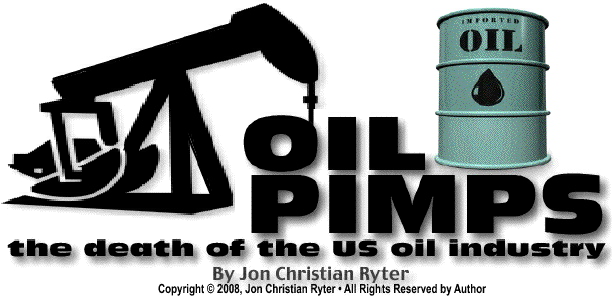
As America feels the growing pain at the pump they need to realize that it is not going to get better—ever...unless we follow the world's lead, nationalize the oil industry, freeze oil prices, and send the oil pimps packing.
![]() f
you pull into a gas station in Islamic Iran, the price at the pump is
40¢ a gallon. In Saudi Arabia—where King Abdullah, the closest
Bush-43 Muslim ally in the Mideast said "Sorry, fellah,"
when President George W. Bush asked him to increase the oil flow
to bring down the global price of a barrel of oil, the price of gasoline
at the pump is 45¢. The Libyans pay 50¢ a gallon at the pump.
In Swaziland, if you have a car, you're only paying 54¢ a gallon.
f
you pull into a gas station in Islamic Iran, the price at the pump is
40¢ a gallon. In Saudi Arabia—where King Abdullah, the closest
Bush-43 Muslim ally in the Mideast said "Sorry, fellah,"
when President George W. Bush asked him to increase the oil flow
to bring down the global price of a barrel of oil, the price of gasoline
at the pump is 45¢. The Libyans pay 50¢ a gallon at the pump.
In Swaziland, if you have a car, you're only paying 54¢ a gallon.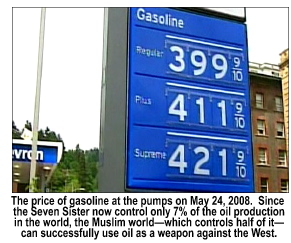 Muslim Qatar charges their citizens 73¢ a gallon at the pump. Bahrain
charges their Islamic citizens 81¢ gallon. In Egypt, Muslim motorists
pay 89¢ a gallon and Kuwait, whose nation was returned to them by
President George H.W. Bush and the US military in 1990, charges
their citizens 90¢ a gallon. America's biggest threat in the western
hemisphere, Venezuelan dictator Hugo Chavez, charges his people
12¢ a gallon for gasoline. The price at the pump down the road from
my home this morning (May 29, 2008) was $3.99 for self-serve unleaded.
In cities where the State taxes are higher than where I live, American
consumers are paying over $4.00 a gallon at the pump. It's time we got
rid of the oil pimps from the Seven Sisters and nationalized oil production
as they do all of the nations of the world except the United States and
the European Union.
Muslim Qatar charges their citizens 73¢ a gallon at the pump. Bahrain
charges their Islamic citizens 81¢ gallon. In Egypt, Muslim motorists
pay 89¢ a gallon and Kuwait, whose nation was returned to them by
President George H.W. Bush and the US military in 1990, charges
their citizens 90¢ a gallon. America's biggest threat in the western
hemisphere, Venezuelan dictator Hugo Chavez, charges his people
12¢ a gallon for gasoline. The price at the pump down the road from
my home this morning (May 29, 2008) was $3.99 for self-serve unleaded.
In cities where the State taxes are higher than where I live, American
consumers are paying over $4.00 a gallon at the pump. It's time we got
rid of the oil pimps from the Seven Sisters and nationalized oil production
as they do all of the nations of the world except the United States and
the European Union.
Because gasoline prices impact how voters perceive their Congressmen and Senators, the Democrats want to make sure the voters blame Republicans for high gas prices and not them. When oil hit $135 per barrel the Democratic-controlled Senate Judiciary Committee and the House Select Committee on Energy Independence subpoenaed the heads of Seven Sisters oil conglomerate and Royal Dutch Shell: John Hofmeister of Shell, Stephen Simon of Exxon-Mobil (the Standard Oil flagship), Peter J. Robertson of Chevron, John Lowe of ConocoPhillips, and Robert Malone of BP for a photo op grillfest that both committees (and the participants from the Seven Sisters) knew would accomplish absolutely nothing because the Seven Sisters, which controlled 85% of the world's oil supply only three decades ago now controls less than 7% of it.
But the purpose of the hearings was not to get lower gasoline prices, but to score points with the voters by embarrassing the heads of the world's largest gasoline retailers by exposing their exorbitant pay scales, and to demand that the oil pimps bring the price of the harlot—gasoline—back into the realm of 20th century reasonableness even though the world is now living in the 21st century and America is no longer the gas king of the world.
Democratic senators and congressmen pretended they are not in the pockets of the Seven Sisters as they grilled five of the highest paid businessmen in America about how much money they earn, stupidly suggesting by their sarcasm in the hearings that gasoline has reached the $4.00 gallon threshold in the United States because these guys earn from $7 to $32.7 million a year (when the stock options are included). The charade served only as comic relief as everyone pretended there was some sort of meaningful substance in the hearings as Senate Democrats threatened them with a windfall profits tax (that will immediately be passed on to US consumers in the form of even higher prices),
Before taking off the kid gloves, the Senate decided to dance around the ring and spar with the oil whores of Wall & Broad to see just how strong their left jabs were going to be. Senate Judiciary Committee Chairman Patrick Leahy started the charade, asking ConocoPhillips chairman John Lowe what his annual compensation was. Leahy began by asking Lowe if his annual compensation was over $100 thousand. In reality, his weekly paycheck (including stock options) was $31,923.00. Lowe let Leahy play his game for a few minutes and conceded that his salary—not his total compensation—was in the $12 million neighborhood. In reality, Lowe lives in an even better neighborhood since his compensation package last year was more like $16.5 million when his stock options were included. Peter J. Robertson, the head of Chevron, the second largest facet of the Seven Sisters, called himself a "regular guy." He earned $28.4 million last year—that translates into over $54.6 thousand per week. Yeah, he's a regular guy all right. How much to the "regular guys" you know earn a week?
But both Lowe and Robertson live in the middle class suburbs compared to Stephen Simon, the tutorial kingpin of the Standard Oil empire and the head of Exxon-Mobil. Simon's compensation package last year was $32.7 million. Simon earns just a hair under $63 thousand a week. Most working class Americans would feel they are pretty middle class if they earn $63 thousand a year—counting the incomes of both spouses.
When he was grilling Robertson, Senate Majority Whip Richard Durbin took offense at the "regular person" comment and shaking his head, said Robertson's remarks were unconscionable, asking him, "Where is the corporate conscience here?" Robertson remarked that the Seven Sisters were investing all they could in alternative energy sources. (A report sent to the Senate by the House Select Committee on Energy Independence showing the lack of interest on the part of the oil industry to create alternative energy sources. The report noted that Exxon-Mobil made net profits of $40 billion last year. What do they do with the money? They bought back $31.8 billion of stock and paid their shareholders dividends of $7.6 billion. They also paid their top 5 executives $76 million. Roughly $10 million was spent on renewable energy research and development.)
But then, why not? While the
oil industry has been spinning the myth that we are past peak oil (and
that's why we have to pay more for each barrel of oil), they know that
[a] oil is replenished by the Earth and [b] they are not about
to create viable alternate sources of energy to compete with, and drive
down the price of, oil. Privately the oil industry understands precisely
why oil reached $135 a barrel. And, they know, in the beginning, there
was only one person in the world to blame.  His
name was John D. Rockefeller, Sr. When you look at the oil whores
around the world, Old John was, without a doubt, the king oil pimp
since he figured out that when too much oil was pumped from the ground,
the prices drop. To keep the price of oil artificially high, Rockefeller
figured out that all he had to do to control the price of oil was to own
the spigot. In two decades Rockefeller's Standard Oil Company controlled
85% of all of the oil that was refined in the United States. By 1890 he
controlled 85% of the refineries in the world. He was the king oil pimp
in the world and the world knew it and despised him.
His
name was John D. Rockefeller, Sr. When you look at the oil whores
around the world, Old John was, without a doubt, the king oil pimp
since he figured out that when too much oil was pumped from the ground,
the prices drop. To keep the price of oil artificially high, Rockefeller
figured out that all he had to do to control the price of oil was to own
the spigot. In two decades Rockefeller's Standard Oil Company controlled
85% of all of the oil that was refined in the United States. By 1890 he
controlled 85% of the refineries in the world. He was the king oil pimp
in the world and the world knew it and despised him.
In 1911 the US government used
the Sherman Antitrust Act of 1896 to breakup Standard Oil—but
allowed Rockefeller to retain control of each of the breakup companies:
Esso (which became Exxon), Mobil (which was originally Standard
Oil of New York), Amoco (which was originally Standard Oil of Indiana),
Chevron (which was originally Standard Oil of California), Atlantic
(which split, becoming both Atlantic Richfield and Sun Oil, which
morphed into Sunoco), Continental Oil (another California Standard
Oil subsidiary that morphed into Conoco), and Standard Oil of New Jersey.
The seventh "sister" was not an oil company. It was a petro-phramaceutical
company that was working to create consumer products from the oil sludge
left when the kerosene was extracted from the oil. The company was Chesebrough-Pond.
Ultimately the Seven Sisters would expand into ten, then, to compete in
the global marketplace, began to contract, becoming what is now called
"the supermarjors." The supermajors needed economic muscle to
compete with the state-owned national giant oil companies whose oil fields
previously belonged to them.  Most
of the Seven Sisters and Royal Dutch Shell oil fields in the third world
were nationalized between 1949 and 1973, weakening and ultimately destroying
the monopolistic global control of oil by the oil pimps since 1880. Nationalization
continues as rising despots in the emerging nations realize that oil means
more than wealth—it means global power.
Most
of the Seven Sisters and Royal Dutch Shell oil fields in the third world
were nationalized between 1949 and 1973, weakening and ultimately destroying
the monopolistic global control of oil by the oil pimps since 1880. Nationalization
continues as rising despots in the emerging nations realize that oil means
more than wealth—it means global power.
In 2006 Venezuelan dictator Hugo Chavez nationalized oil fields belonging to Citgo, Exxon-Mobil, Conoco-Phillips, Chevron, Total SA, BP, Statoil, Lukoil, Occidental and all other privately-owned oil companies in his country. (Since Venezuela was the majority shareholder in Citgo, Citgo became Chavez's personal oil company. Bolivia nationalized foreign oil companies within its territory within weeks of the Venezuelan action.
In 2007, shortly after the Venezuelan courts rubber-stamped Chavez's heavy-handed seizure, Vladimir Putin nationalized Gazprom and Lukoil. The United States and the western bloc industrialized nations have the misfortune of being forced to buy oil from nations unfriendly to US policy. Without those nations—which include all of the oil-producing Muslim nations in the world, Russia, China, Columbia and Mexico. If the United States stopped buying oil from our economic and political enemies, we would have a 2.8 million barrel daily shortfall, which amounts to 25% of this country's oil consumption.
In the chart, below, oil reserves are shown in millions of barrels and gas reserves are shown in billions of cubic feet. The total reserves, combining both oil and gas reserves, are computed in "oil equivalent" barrels (indicated in millions of barrels). For example, the oil reserves for Iran are 136,000 million barrels. Natural gas reserves are depicted at 974 billion cubic feet, and the adjusted equivalent in barrels is 302,496 million barrels.
|
# |
Nationalized
Company |
Country |
Oil
Reserve |
Gas
Reserve |
Total |
|
1 |
National
Iranian Oil Co. |
Iran |
135,000 |
974,000 |
302,496 |
|
2 |
Aramco |
Saudi
Arabia |
259,400 |
248,500 |
302,279 |
|
3 |
Qatar
Petroleum Corp. |
Qatar |
15,207 |
910,500 |
170,848 |
|
4 |
Iraq
National Oil co. |
Iraq |
115,000 |
112,000 |
134,145 |
|
5 |
Abu
Dhabi Oil Co. |
UAE |
92,200 |
198,500 |
126,132 |
|
6 |
Kuwait
Petroleum Corp. |
Kuwait |
99,000 |
54.500 |
108,316 |
|
7 |
Petroleos |
Venezuela |
80,120 |
152,380 |
106,060 |
|
8 |
Nigerian
Nat'l Petroleum |
Nigeria |
36,220 |
181,900 |
67,314 |
|
9 |
National
Oil Co. |
Libya |
41,464 |
52,650 |
50,464 |
|
10 |
Sonatrach |
Algeria |
12,270 |
161,740 |
39,918 |
|
11 |
Gazprom |
Russia |
0 |
171,176 |
29,261 |
|
12 |
PetroChina,
Ltd. |
China |
11,618 |
53,469 |
20,758 |
|
13 |
OAS
Rosneft |
Russia |
15,963 |
24,758 |
20,195 |
|
14 |
Petronas |
Malaysia |
5,300 |
82,096 |
19,334 |
|
15 |
OAO
Lukoil |
Russia |
15,927 |
26 |
15,931 |
|
16 |
Petroleos |
Mexico |
12,849 |
13,656 |
15,218 |
|
17 |
Egyptian
Petroleum |
Egypt |
3,700 |
58,500 |
13,700 |
|
18 |
Total |
France |
6,592 |
25,835 |
10,958 |
|
19 |
Petroleum
Development |
Oman |
5,500 |
30,000 |
10,628 |
|
20 |
Petroleo
Brasilerio |
Brazil |
9,418 |
1,166 |
9,618 |
|
21 |
Royal
Dutch/Shell |
Netherlands |
3,270 |
30,058 |
8,408 |
|
22 |
Sonangol |
Angola |
8,000 |
2,000 |
8,342 |
|
23 |
ENI |
Italy |
3,481 |
16,965 |
6,381 |
|
24 |
Dubai
Petroleum |
UAE |
4,000 |
4,000 |
4,684 |
|
25 |
Petroleos
de Ecuador |
Ecuador |
4,517 |
unknown |
4,517 |
|
26 |
Pertamina |
Indonesia |
903 |
20,538 |
4,517 |
|
27 |
Stateoil |
Norway |
1,675 |
14,255 |
4,112 |
|
28 |
China
Offshore Oil |
China |
1,490 |
6,232 |
2,555 |
|
29 |
Repsol
YPF |
Spain |
1,057 |
8,718 |
2,548 |
|
30 |
Ecopetrol |
Columbia |
1,453 |
3,996 |
2,136 |
The Organization of Petroleum Exporting Countries was formed by Algeria, Angola, Ecuador, Indonesia, Iran, Iraq, Kuwait, Libya, Nigeria, Qatar, Saudi Arabia, the United Arab Emirates and Venezuela. At the conclusion of the Six Day War in 1967, the Muslim nations formed a splinter oil cartel within OPEC called the Organization of Arab Petroleum Exporting Countries as an economic weapon to be used against the capitalist countries in the West. The oil producing Arab nations, together with Russia and China, control 1,617,256 million barrels of oil. The Seven Sisters are sitting on active reserves of 39,000 million barrels. While that represents about 2% of the current oil supply—about the same amount as Algeria—the Seven Sisters actually controls 7% to 10%. They just aren't doing anything with the reserves for which they own the leases. Many of the unused leases they are sitting on are in the Northern Slope of the Arctic National Wildlife Refuge, under the Arctic ice, in the Florida Keys where China has currently sunk at least one well 17 nautical miles from Key West, and the Gulf of Mexico, where geologists believe there is more oil than exists on the Arabian Peninsula.
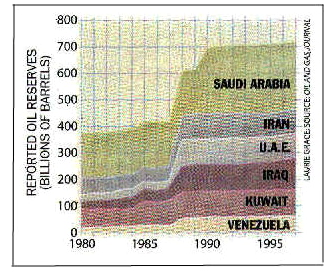 Today
"Big Oil," which was instrumental in blocking oil exploration
and drilling in most of North America, is now dwarfed and financially
overwhelmed by the national oil giants that formed their own cartel—OPEC—on
Sept. 14, 1960 to bully the supermajors and, most of all, the industrial,
economic and military establishments of the free enterprise nations into
submission. For the most part, the oil fields they nationalized belonged
to either the Seven Sisters, Royal Dutch Shell, Occidental Petroleum,
Hess, Devon, Apache, or some other American or European oil company.
Today
"Big Oil," which was instrumental in blocking oil exploration
and drilling in most of North America, is now dwarfed and financially
overwhelmed by the national oil giants that formed their own cartel—OPEC—on
Sept. 14, 1960 to bully the supermajors and, most of all, the industrial,
economic and military establishments of the free enterprise nations into
submission. For the most part, the oil fields they nationalized belonged
to either the Seven Sisters, Royal Dutch Shell, Occidental Petroleum,
Hess, Devon, Apache, or some other American or European oil company.
While they still maintain financial clout over the industrialized nations, the Seven Sisters no longer have the global monopoly they had before the second and third world countries (who now control 80% of world's oil reserves) nationalized the oil fields within their borders and gained political control of the most important natural resource in the world. The nationalization of the oil industries by the world's totalitarian governments is nothing new. The first industry nationalized by the Soviet Union in 1917 was oil. Today, totalitarian regimes control 80% of the world's oil. The world's emerging economies, in particular China, India and Indonesia (the world's most human capital-rich nations) are rapidly becoming industrialized by the world's greediest transnational industrialists and merchant princes. They see the third world as the profit center of the 21st century.
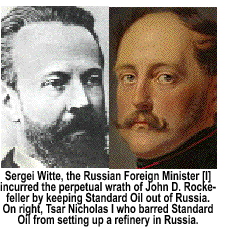 Sadly
the barons of business and the regents of retail have forgotten the nightmares
of the early 20th century that resulted when the oil barons and princes
of industry used their political clout to send nations to war when despots
seized their corporate assets, or when the heads of states of other nations
refused to give in to their economic extortion. When oil was discovered
in the Baku oil fields near the Caspian Sea in Russia, in 1873, it was
completely controlled by Tsar Nicholas I's banker, Baron Alphonse
Rothschild and the Swiss munitions manufacturers, Robert and
Alfred Nobel. The Nobel Brothers controlled the refining
and distribution of the Russian oil through Europe, greatly impacting
the marketing of Standard Oil kerosene in Europe. By 1884 the Nobel
Brothers were pumping as much oil in Russia as Rockefeller was
in the United States. Rockefeller was determined to corner the
oil market in Russia, but he was blocked by Count Sergei Witte,
the Russian Finance Minister who knew Rockefeller's reputation
in the United States.
Sadly
the barons of business and the regents of retail have forgotten the nightmares
of the early 20th century that resulted when the oil barons and princes
of industry used their political clout to send nations to war when despots
seized their corporate assets, or when the heads of states of other nations
refused to give in to their economic extortion. When oil was discovered
in the Baku oil fields near the Caspian Sea in Russia, in 1873, it was
completely controlled by Tsar Nicholas I's banker, Baron Alphonse
Rothschild and the Swiss munitions manufacturers, Robert and
Alfred Nobel. The Nobel Brothers controlled the refining
and distribution of the Russian oil through Europe, greatly impacting
the marketing of Standard Oil kerosene in Europe. By 1884 the Nobel
Brothers were pumping as much oil in Russia as Rockefeller was
in the United States. Rockefeller was determined to corner the
oil market in Russia, but he was blocked by Count Sergei Witte,
the Russian Finance Minister who knew Rockefeller's reputation
in the United States.
As new oil discoveries around the world became as commonplace as mosquito bites at a weekend picnic at the lake, the internal combustion engine changed the global demand for oil. Everyone and his brother became an oil wildcatter. As he fought the Nobels and Rothschild to get a toehold in Russia that would be denied him by Witte, Rockefeller also fought a losing battle in Burma and Java against both Royal Dutch Oil and a wildcatter named Marcus Samuel who owned the Shell Transport & Trading Co. They would ultimately merge to stave off a takeover by Standard Oil. In Rockefeller's mind, the biggest threat to Standard Oil was Caspian Sea oil. Because the Standard Oil name was so hated, Rockefeller formed the Anglo-American Oil Company to compete in Europe and Asia. In the end, the prize he sought—Russia—remained beyond his grasp.
In the first decade of the 20th century, Standard Oil,
together with New York bankers Andrew Mellon, J. P. Morgan,
steel magnate and financier Andrew Carnegie, and several barons
of business formed a company called the American International Corporation
[AIC]. They entered into a covert plot to finance the overthrow the government
of Tsar Nicholas II. The Bolsheviks, who were comprised
of over 150 thousand active members in 1905, dwindled to 20 thousand hardcore
discontents in 1916.  Led
by Marxist extremists Leon Trotsky and Vladimir Ulyanov
(whom the world would know as Lenin), they led demonstrations in
Moscow and St. Petersburg advocating the overthow of the monarchy. Had
it not been for the interference from greedy US businessmen who wanted
to recreate their own version of the United States in central Europe,
the Bolshevik Revolution would have been remembered by history
as the Bolshevik demonstrations that, ultimately, led to a slightly more
democratic monarchy in Russia. Instead, democracy collapsed completely
and, in its place, came the most abusive totalitarian government the world
had ever seen until the formation of the People's Republic of China in
1945.
Led
by Marxist extremists Leon Trotsky and Vladimir Ulyanov
(whom the world would know as Lenin), they led demonstrations in
Moscow and St. Petersburg advocating the overthow of the monarchy. Had
it not been for the interference from greedy US businessmen who wanted
to recreate their own version of the United States in central Europe,
the Bolshevik Revolution would have been remembered by history
as the Bolshevik demonstrations that, ultimately, led to a slightly more
democratic monarchy in Russia. Instead, democracy collapsed completely
and, in its place, came the most abusive totalitarian government the world
had ever seen until the formation of the People's Republic of China in
1945.
Rockefeller justified his part in the overthrow of the Russian monarchy because Sergei Witte convinced Tsar Nicholas II it would not be in the best interests of the Russian government to allow Rockefeller to do business in Russia under any name. In the end, after the Bolsheviks overthrew the legitimate government of Russia and assassinated Tsar Nicholas II and his family, Lenin reneged on his word to the barons of business, causing the AIC to turn to the less radical Mensheviks (called the "White Russians" by the media) to overthrow the Bolsheviks, bringing about a decade-long civil war in the fledging Soviet Union. But this was only part one of a two-part saga. Part two occurred as World War I came to a close when British and American Expeditionary Forces captured the Baku oil fields near the Caspian Sea.
Under pressure from AIC, when Wilson ended the war with Germany, he quietly left the "Russian situation" unresolved. Financed by AIC, the White Russians revolted against the Reds. Less than 3 months before armistice ended the fighting in Europe, British forces overthrew the Bolsheviks in Baku on August 4, 1918. They held the oil fields until April 28, 1920—16 months after the official end of World War I and 21 months after the last "official" bullets were fired in the anger of war. American and British troops were still fighting, but they were not fighting Germans. They were fighting Russians, who—at least theoretically—were still, officially, allies of the United States. Questions were raised in the United States why the American army was fighting Standard Oil's private war to keep the Baku oil fields. Unable to answer the question, the Wilson Administration quietly brought the doughboys home. In May, 1920, the last cannons of war were silenced. World War I was over, but the war to control the flow, and price of oil, had just begun. The oil pimps postwar game plan in the Baku oil fields of Georgia (not the State, the country) gives you an idea of precisely how much clout of the Seven Sisters possessed in the early decades of the 20th century.
In 1972 under what is now known as the Nixon Doctrine (or, to some, the Guam Doctrine), President Richard Nixon pledged to beef-up the military strength of Shah Reza Pahlavi's Iranian government and make it the strongest nation in the Mideast. Nixon assured Shah Pahlavi that he would be able to assert his authority over the region. At this point in history the Soviets had reached the zenith of power at home and around the world.
They had a robust economy and
had become the world's leading producer of steel and oil. As the Soviet
economy flourished, the economy of the United States strained under OPEC's
oil embargo of 1972-73. The world watched
the Soviets prevail against the United States on the international stage.
The Soviets launched a campaign in the early 1970s supporting the return
to Iran of Ayatollah Ruhollah Khomeini, a Marxist Muslim who was
tied to the Russian Bolshevik Party since 1916. 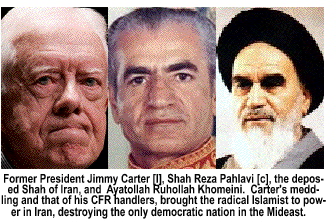 The
Soviets believed if Khomeini was allowed back in the country, with
the help of the Soviets, he would be able to seize power and further damage
the floundering United States. Nixon and President Gerald Ford
continued to support the Shah.
The
Soviets believed if Khomeini was allowed back in the country, with
the help of the Soviets, he would be able to seize power and further damage
the floundering United States. Nixon and President Gerald Ford
continued to support the Shah.
When Carter was elected in 1976, his Council on Foreign Affairs [CFR] advisors and Secretary of State Henry Kissenger pushed him to jettison the Shah of Iran and cut a deal with Khomeini, whose influence in Iran was rising steadily (even though he was still in exile). OPEC continued leveraging the US by raising oil prices even as geologists discovered an estimated 3.2 billion barrels of oil in a reserve just off the coast of California, and another 9.6 billion barrels in a sliver of land set aside for drilling in Prudhoe Bay on the North Slope of Alaska.
As OPEC spent the 1970s raising oil prices, the United States could have ended its dependency on Arab oil by tapping into existing wells in the United States, or drilling new wells in the Gulf of Mexico or off the coast of California, or in Alaska. Environmentalists funded by the oil industry and other wealthy industrialists lobbied Congress to prevent drilling in any "environmentally-sensitive" areas—which to the environmentalists meant anywhere in North America. The oil pimps preferred drilling in sand rather than rock. Arab oil was cheap—and it was plentiful. On top of it, OPEC was doing the Seven Sisters a favor by leveraging the price of oil skyward. In 1972 the price of crude was about $3 per barrel. By 1974 it quadrupled to $12 per barrel. Taking a lesson from the Standard Oil playbook on supply and demand, the Arabs cut oil production by 5 million barrels per day, reducing it even more as other oil producing countries increased their output to compensate for the Arab global shortfall.
Beginning in 1974 OPEC and the nationalized oil giants, not the Seven Sisters nor the privately owned oil companies controlled the global price of oil. In a period of six months in 1978, OPEC increased the price of crude oil by 400%. When we watched our erstwhile oil giants "dangling in the wind" before blowhard Senators and Congressmen making pomp for the press, how many of us realized these guys had completely and irrevocably lost control of the oil spigot because they stopped pumping US oil years ago only because Mideast oil was more profitable? Convinced at the time that oil is a finite resource, the supermajors decided it was smarter to use up the oil outside the United States first, so when 90% of the world's oil was gone, what was left—in the United States—would be worth hundreds of dollars per barrel.
Besides, what OPEC was doing fit well with the plans of the supermajors to get the price of oil over $100 per barrel—without them getting the blame. One hundred dollar oil makes it profitable to drill in ANWR, and it makes digging super-deep wells into the Earth's crust that are needed to tap the oil lakes deep in the mantle of Earth (where, by the way, no dinosaurs or fossil vegetation ever lived) where oil is manufactured by the planet in one of those unexplainable mysteries of the universe.
Within days of the oil pimps making one of their increasingly frequent appearances before Congress to explain why gas prices are so high, the Commodity Futures Trading Commission announced on Thursday, May 29 that it had been investigating Wall Street and the oil pimps for the past six months to determine whether they, the Wall Street speculators, investment bankers and hedge funds have engaged in any illegal manipulation of the oil market. On the heels of their announcement oil, which gained 86% over the past year, dropped from $135.09 to $126.62. On Friday, crude prices dropped again, this time to $124.67. As oil prices slid, the dollar rebounded since the dollar is affected by two quintessential risk factors: a volatile stock market and skyrocketing crude oil prices.
The public outcry against the rapidly escalating price of oil has not slowed the zeal of the Wall Street hedge funds from bidding up the price of oil, with some bankers predicting that oil will reach $200 barrel before the end of the year. The speculation, they claim, is based on the soaring demand for oil by the emerging economies where all of the new jobs are being created to support the growing global economy of the transnational industrialists. What no one seems to notice is that the factories that are now churning out products in China and Indonesia are the same factories that were churning out the same products in the United States before those jobs were sent overseas and the factories that produced the jobs and the products were shut down. While we should expect some increase from the new factories in the third world since they will be seeking out new customers as well as serving the replacement markets in the industrialized nations, there are not enough "new consumers" yet to merit the increase in demand for oil touted by the Wall Street bankers and hedge funds that are bidding up the price of oil—particularly since there are no oil shortages, there is no "peak oil" problem, and the holding tanks at all of the refineries in America are full. These are the "unprecedented market conditions" that caused the Commodity Futures Trading Commission to quietly initiate an investigation of the Wall Street bankers and hedge fund operators in December of last year.
Most of the oil alarmists—both bankers and the hedge fund gamblers—are heavily positioned in the oil market. That means their irresponsible actions are specifically designed to profit them. The current investigation appears to be centered on the hedge funds and futures brokers with the Commodity Futures Trading Commission promising to detect and punish futures market manipulators.
Senate Energy and Natural Resources Committee Chairman Jeff Bingaman [D-NM] told federal regulators earlier that he was concerned that Wall Street futures traders were escaping federal scrutiny by placing their trades (those currently driving up the price of oil) through anonymous offshore exchanges called "dark pools" where unscrupulous swap dealers skirt federal regulations as they drive up the price of oil on the global market.
Sen. Pete Domenici [R-NM] the ranking Republican on the Senate Energy and Natural Resources Committee heralded the actions of the Commodity Futures Trading Commission, adding that their investigation will help determine whether legislative remedies are need. In the last six years, the price of oil—the most plentiful fuel in the world—has increased sixfold solely because of rumor-mongering and shady trading by futures brokers and the artificial shortages masterminded by the oil pimps who slowed the spigot in the Seven Sisters' refineries to convince the consumers that there was a shortage when, in reality, the was a glut. If Domenici, who has been in the US Senate for 36 years, can't tell when the oil pimps are abusing the trading laws, its good that the Senator has decided to retire this year. All three of New Mexico's Congressman are trying to get his seat. It's unclear whether 6-term liberal Republican Heather Wilson or 3-term conservative Steve Pearce will snag the GOP nomination, but Tom Udall walked off with the Democratic nomination. Domenici has endorsed his protege, Wilson. That's reason enough to vote for Pearce.
Fueled by Seven Sisters fantasies about peak oil combined with the greed of oil and commodities traders, most economist and many legislators are convinced that if the oil pimps and the money pimps are allowed to continue unchecked, the oil and commodities markets will be afflicted with the fever that fed the technology stocks in the late 1990s, sending completely worthless stock soaring the pinnacles achieved only by the best of the blue chips.
It's time for the American people to reevaluate their place in the world, their role in history, and what is in store for them if they do not take back their own destiny. Oil is not a commodity that can trusted to any one man, any one family or a close knit cartel of powerful, greedy men at the pinnacle of power even in a free enterprise system like the United States that is controlled by special interest groups funded by cartels of powerful, greedy men who are reshaping the world into a one world political, economic and religious entity only because it suits their purpose to do so.
Oil has become a weapon in that battle for supremacy in the emerging global state. In that battle, the leaders of those nations have nationalized oil and are using oil as a weapon against the United States and the industrialized nations of Europe. These totalitarian regimes control 80% of the oil in the world. Wisely, they have chosen not to wage economic terrorism against their own people. Hugo Chavez, who has aligned himself politically with China, Bolivia, Cuba, Iran and anyone else who hates America, votes with OPEC to drive up the price of oil, charges the Venezuelan people 12¢ a gallon for gas. None of the totalitarian regimes who have nationalized oil prices charge their own citizens more than 90¢ a gallon for gas. European motorists pay upwards of $9.00 a gallon for gasoline and, in the United States, Americans are how paying upwards of $4.50 a gallon for unleaded regular.
The United States has reached a crossroads in its national life. If it continues on the path it is traveling, we will cease to exist as a nation within a decade. The transnationalist industrialists, bankers, the barons of business and regents of retail will simply move their corporate offices to the new retail centers in the emerging economies where tomorrow's consumers reside. Over the next decade, they will simply shut down their unprofitable US operations which, due to FDR-era federal regulations and costly fringe benefits like health insurance, retirement funds, the 40-hour work week and paid vacations, favor the working class. There is no Taft-Hartley in the third world.
The American people—and their government (those folks in bed in Big Oil and Big Business which fills their campaign war chests with millions of quid pro quo dollars)—need to realize what Franklin D. Roosevelt realized in 1935. If the pimps and prostitutes of Big Business are not restrained, their greed will destroy the rest of us. Roosevelt declared a state of national emergency in the United States on March 9, 1933 that remained in effect until Sept. 14, 1976 when House and Senate Special Committees to Terminate the National Emergency ended it. On that date Congress enacted, and President Gerald Ford signed into the law the National Emegencies Act of 1976 (50 USC 1601), Public Law 94-412. Before the National Emegencies Act of 1976 was enacted, President George W. Bush could have declared a national emergency and nationalized the oil industry. At the same time, under that same emergency, he could have opened ANWR to oil drilling, reopened the closed oil refineries under the control of the Department of Energy. But even more important, that president— or any president—could place a ceiling on the price of domestic oil at, say, $50 per barrel. Furthermore, under the current national emergency on oil, the president could, under the condidtions that existed prior to the passage of National Emegencies Act of 1976, decree that domestic oil cannot be exported, that the entire output of oil pumped from under sovereign US soil, without exception or waiver, must be consumed within the territorial limits of the United States.
Of course, when the Democratically-controlled Congress enacted that legislation, they did so to control adversarial presidents like Richard Nixon. No president, without the full support and backing of Congress, has the singular authority to declare a national emergency of any type let alone one that lasts four-decades. Section 201.a of the National Emegencies Act of 1976 transferred the authority to create national emergencies from the White House to Congress. Thus, the power to do what is proposed here still exists providing Congress converts the presidential decree into law. What does not exist on Capitol Hill is the will to do it. Congress—on both sides of the aisle—has been in bed with the enemy for so long they no longer recognize the enemy as the enemy. To most of them, the enemy is us, a nation of working class stiffs who are patriotically known as "we the people."

Copyright © 2009 Jon Christian Ryter.
All rights reserved.


